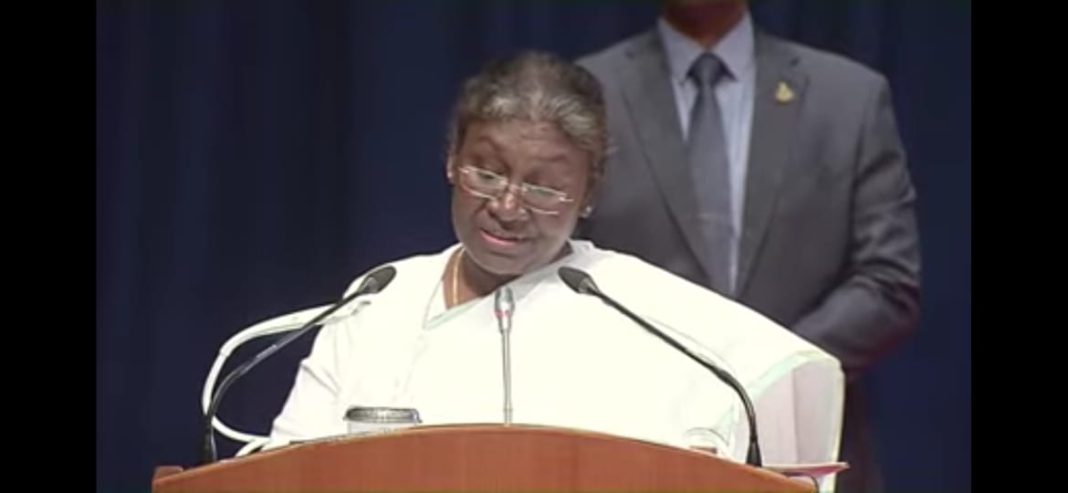President Droupadi Murmu on Saturday said the most significant beauty of Indian Constitution was illustrated by the fact that all three pillars of democracy- the Legislature, the Executive and the Judiciary respect their Lakshman Rekha and stay in their own realm.
Participating in the Constitution Day celebrations at the Supreme Court premises this evening, the President said that in the zeal to best serve the citizens, any of the three pillar or organs could have been tempted to overstep, but, they have always have always kept the boundaries in mind while serving the people.
Calling Preamble as both the core and foundation stone of the Constitution, the President said the makers of the Constitution were soldiers of Father of the Nation, Mahatma Gandhi, whose imprint was clearly visible on the Constitution.
She said the visionary leadership of Mahatma Gandhi created a generation of great leaders, adding that equally important was the contribution of Dr. B.R. Ambedkar, reverred to as the Father of the Constitution.
Talking about females, she said women leaders played a major and leading role as members of the Constituent Assembly. When the West was debating on the rights of women, they were playing an important part in writing of the Indian Constitution.
At this point, the President mentioned the names of Durgabai Deshmukh, Hansa Jivraj Mehta, Sucheta Kriplani and Vijaya Lakshmi Pandit. She said that Vijaya Lakshmi Pandit even became the first woman to head the Assembly of the United Provinces.
Referring to her predecessor Ram Nath Kovind, she said that he was also associated with the Law and Justice sector.
The President said, “The onus is on each one of us to make the process of seeking justice accessible to all. I appreciate the efforts made by the Supreme Court in this regard.”
She further praised the Supreme Court and other courts of the country for making the judgements available in Indian languages, saying that this made an average citizen a stakeholder in the system.
Still, the legal language was difficult to understand with jargons playing an important part of any verdict, noted the President, adding that she hoped that the day was not far when people outside the legal fraternity, including the common man, would be able to read the verdicts easily.
Murmu further suggested translation of legal language into vernaculars for the ease of ordinary citizens and said, “I am confident that this court will remain the sentinel of justice”.
Talking about her village Uparbeda, the President said, “I come from a very small village, which lacked basic facilities. We used to consider three professions as Gods – Teachers, Doctors and Lawyers. While Teachers imparted education and doctors gave the gift of life to many, people who were in misery went to the lawyers for relief.
“When I was an MLA, I had the opportunity to visit jails. I wanted to know how the prisoners lived there. I became a part of the Home Standing Committee and tried to make changes, but I could not do much. However, when I was made the Governor of Jharkhand, I had the opportunity and did my bit,” she added.
Acknowledging the contribution of Jharkhand State Legal Services Authority (Jhalsa), former Chief Justice of Jharkhand High Court Pradip Kumar Mohanty and former Chief Justice of Delhi High Court DN Patel, the President appealed to all distinguished people attending the event to do something for the people languishing in jails.
Stating that they neither knew about their fundamental rights, nor fundamental duties, the President said some of them were languishing in jails for the past 15-20 years and some had been there for more than 25 years. She said their families were not able to release them due to lack of funds and unawareness about their rights.


